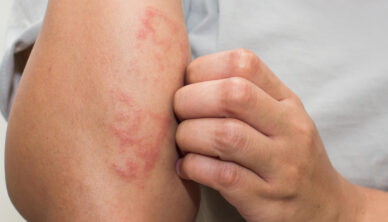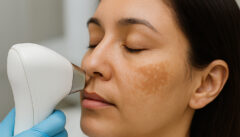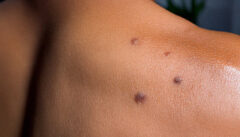Contents
Ezcema

We provide specialist diagnosis and treatment for eczema, helping patients manage symptoms and prevent flare-ups.
What is Eczema?
Eczema, also known as atopic dermatitis, is a chronic skin condition that causes inflammation, redness, itching, and dryness. It occurs when the skin’s natural barrier function is weakened, making it more sensitive to irritants and allergens. Eczema is common in both children and adults and can range from mild to sever
Types of Eczema:
- Atopic Dermatitis – The most common type, often linked to allergies and asthma.
- Contact Dermatitis – Triggered by allergens or irritants (e.g., soaps, detergents, metals).
- Dyshidrotic Eczema – Small, itchy blisters on the hands and feet.
- Nummular Eczema – Coin-shaped, itchy patches that appear after skin injuries.
- Seborrheic Dermatitis – Affects oily areas like the scalp, face, and chest.
- Stasis Dermatitis – Often occurs in people with poor circulation, leading to swelling and redness in the lower legs.
Potential Causes
The exact cause of eczema is not fully understood, but several factors can contribute to its development:
- Genetics – A family history of eczema, asthma, or hay fever increases the risk.
- Immune System Overactivity – The immune system reacts aggressively to irritants, leading to inflammation.
- Skin Barrier Dysfunction – A weakened skin barrier allows moisture to escape and irritants to enter.
- Environmental Triggers – Cold weather, allergens, pollution, and humidity can worsen eczema.
- Irritants & Allergens – Soaps, detergents, perfumes, dust, pet dander, and certain fabrics.
- Stress & Hormonal Changes – Can trigger or worsen eczema flare-ups.
Signs & Symptoms
Eczema symptoms vary from person to person and may come and go. Common symptoms include:
- Red, inflamed skin – Often appears on the face, hands, elbows, and knees.
- Intense itching – Can lead to scratching, which worsens symptoms.
- Dry, scaly patches – The skin may feel rough, cracked, or flaky.
- Blisters or oozing sores – In severe cases, the skin may weep fluid.
- Thickened or leathery skin – Chronic eczema can cause the skin to harden over time.
- Darkened or discolored skin patches – More common in individuals with darker skin tones.
Diagnosis
At Royal Buckinghamshire Hospital, our dermatologists diagnose eczema through:
- Clinical Examination – Assessing skin appearance and medical history.
- Patch Testing – Identifying allergens that may trigger eczema.
- Blood Tests – Checking for immune system markers and allergies.
- Skin Biopsy (if necessary) – To rule out other skin conditions.
Treatment Options
Although eczema cannot be cured, treatments can help manage symptoms and reduce flare-ups.
Topical Treatments:
- Moisturizers & Emollients – Hydrate and repair the skin barrier.
- Corticosteroid Creams – Reduce inflammation and itching.
- Calcineurin Inhibitors (Tacrolimus, Pimecrolimus) – Help control immune response.
Phototherapy – Light Therapy:
- UVB Therapy – Helps control inflammation and itchiness.
- PUVA Therapy – A combination of UVA light and a photosensitizing medication.
Medications – for Severe Ezcema :
- Antihistamines – Reduce itching and allergic reactions.
- Oral Corticosteroids – For severe flare-ups, used short-term.
- Biologic Injections (Dupilumab, Tralokinumab) – Target inflammation in moderate to severe cases.
Lifestyle & Home Remedies:
- Avoiding Triggers – Identifying and minimizing exposure to irritants.
- Using Gentle Skincare Products – Fragrance-free soaps and moisturizers.
- Taking Lukewarm Baths – Helps hydrate the skin without irritation.
- Wearing Soft, Breathable Fabrics – Avoiding wool and synthetic materials.
Monitoring and Follow-Up Care
- Regular Dermatology Check-Ups – Adjusting treatment plans based on skin response.
- Education on Eczema Management – Helping patients recognize triggers and prevent flare-ups.
- Psychological Support – Managing the emotional impact of eczema.
- Allergy Testing & Management – Addressing underlying allergies contributing to symptoms.
Arranging To Visit A Private GP

If you are struggling what you might think to be likely Ezcema, then you can make an appointment with one of our private GPs who can refer you to our specialist dermatologists. Appointments are available to everyone and can often be booked for the same day. There is no need to be registered with our The Royal Buckinghamshire Hospital, or live locally.
If you have insurance which covers a GP visit, we can in most cases invoice the insurer directly. Where you are paying directly, the cost for a 30 minute consultation is £100.
Any additional costs will always be discussed. They could apply if you are referred for an MRI scan, or to a consultant, or for other agreed decisions to support your health.
Our Resident Private GP
Dr Chamali is welcoming and highly experienced. He offers his patients sound diagnosis and treatment, along with individual care focused on their future health.
24 March 2025




